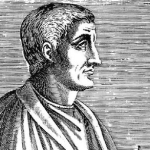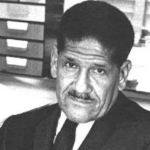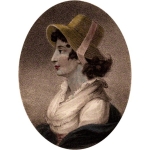A wanderer is man from his birth.
He was born in a ship
Brimming with wonder and joy
He spreads out his arms to the light,
Rivets his gaze on the banks of the stream.
As what he sees is, so have his thoughts been.
Whether he wakes,
Where the snowy mountainous pass,
Echoing the screams of the eagles,
Hems in its gorges the bed
Of the new-born clear-flowing stream;
Whether he first sees light
Where the river in gleaming rings
Sluggishly winds through the plain;
Whether in sound of the swallowing sea—
As is the world on the banks,
So is the mind of the man.
Vainly does each, as he glides,
Fable and dream
Of the lands which the river of Time
Had left ere he woke on its breast,
Or shall reach when his eyes have been closed.
Only the tract where he sails
He wots of; only the thoughts,
Raised by the objects he passes, are his.
Who can see the green earth any more
As she was by the sources of Time?
Who imagines her fields as they lay
In the sunshine, unworn by the plough?
Who thinks as they thought,
The tribes who then roam'd on her breast,
Her vigorous, primitive sons?
What girl
Now reads in her bosom as clear
As Rebekah read, when she sate
At eve by the palm-shaded well?
Who guards in her breast
As deep, as pellucid a spring
Of feeling, as tranquil, as sure?
What bard,
At the height of his vision, can deem
Of god, of the world, of the soul,
With a plainness as near,
As flashing as Moses felt
When he lay in the night by his flock
On the starlit Arabian waste?
Can rise and obey
The beck of the Spirit like him?
This tract which the river of Time
Now flows through with us, is the plain.
Gone is the calm of its earlier shore.
Border'd by cities and hoarse
With a thousand cries is its stream.
And we on its breast, our minds
Are confused as the cries which we hear,
Changing and shot as the sights which we see.
And we say that repose has fled
For ever the course of the river of Time.
That cities will crowd to its edge
In a blacker, incessanter line;
That the din will be more on its banks,
Denser the trade on its stream,
Flatter the plain where it flows,
Fiercer the sun overhead.
That never will those on its breast
See an ennobling sight,
Drink of the feeling of quiet again.
But what was before us we know not,
And we know not what shall succeed.
Haply, the river of Time—
As it grows, as the towns on its marge
Fling their wavering lights
On a wider, statelier stream—
May acquire, if not the calm
Of its early mountainous shore,
Yet a solemn peace of its own.
And the width of the waters, the hush
Of the grey expanse where he floats,
Freshening its current and spotted with foam
As it draws to the ocean, may strike
Peace to the soul of the man on its breast—
As the pale waste widens around him,
As the banks fade dimmer away,
As the stars come out, and the night-wind
Brings up the stream
Murmurs and scents of the infinite sea.


















Comment form: